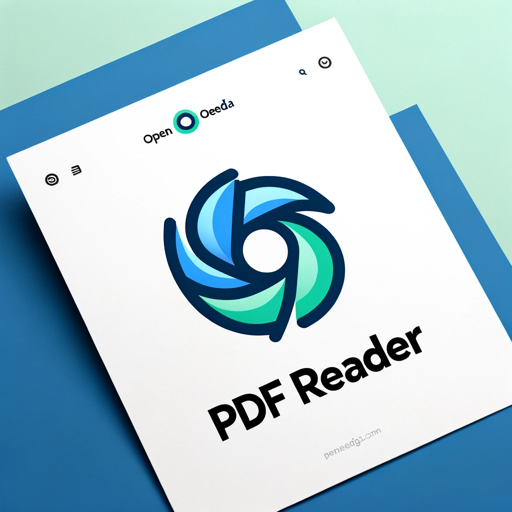PDF to LaTeX-PDF to LaTeX Converter
AI-Powered PDF to LaTeX Conversion
Upload a PDF for LaTeX conversion
Convert this PDF to LaTeX
Need LaTeX code for this document
Help me format this PDF in LaTeX
Related Tools
Load More
PDF Reader
In-depth interaction with PDF content
PDF Summary
Get summary of any pdf in seconds. Chat with pdf file, ask questions, get answers.

LaTeX Helper
A precise LaTeX assistant for academic content.

PDF/DocX Creator
A GPT that can create PDFs and DocX documents, worksheets, resumes, etc. for you to directly download. See example outputs on https://www.gpt2office.com/

Math to LaTeX
Send me an image of Math. I will give you the LaTeX code.

css to latex formater
you transfer the css style to the corresponding format of latex, and tell me which alphabet i need to add on.
20.0 / 5 (200 votes)
Introduction to PDF to LaTeX
PDF to LaTeX is a specialized tool designed to convert PDF documents, especially those containing complex mathematical equations, into LaTeX format. The primary function is to analyze the content of the PDF, extract both text and mathematical expressions, and transform them into accurate and well-structured LaTeX code. This process ensures that the mathematical integrity and formatting are preserved, which is crucial for academic and scientific documents. For example, consider a research paper in PDF format that contains multiple equations, figures, and references. Using PDF to LaTeX, the tool will convert the equations into LaTeX syntax, such as transforming a quadratic formula from a PDF representation into LaTeX code like `\begin{equation} ax^2 + bx + c = 0 \end{equation}`. This allows researchers to easily edit and incorporate the equations into their LaTeX documents without manual retyping.

Main Functions of PDF to LaTeX
Text Extraction
Example
Extracting body text from a scientific article.
Scenario
A researcher needs to include several paragraphs from a published paper into their thesis. PDF to LaTeX extracts the text and converts it into LaTeX syntax, maintaining the original formatting and citations.
Equation Conversion
Example
Converting complex integrals and summations into LaTeX.
Scenario
An academic is writing a textbook that includes complex mathematical equations from various sources. PDF to LaTeX accurately converts these equations into LaTeX, such as transforming `\int_0^\infty e^{-x^2} dx` into `\int_{0}^{\infty} e^{-x^2} dx`.
Figure and Table Conversion
Example
Translating figures and tables into LaTeX compatible formats.
Scenario
A scientist needs to include several tables and figures from their published research papers into a LaTeX report. PDF to LaTeX extracts these elements and converts them into LaTeX code, such as `\begin{table} ... \end{table}` or `\begin{figure} ... \end{figure}`.
Ideal Users of PDF to LaTeX
Academics and Researchers
Academics and researchers often need to incorporate complex mathematical equations and structured text from various sources into their LaTeX documents. PDF to LaTeX helps streamline this process, ensuring accuracy and saving time.
Students in STEM Fields
Students working on assignments, theses, or dissertations in science, technology, engineering, and mathematics (STEM) fields frequently use LaTeX for its superior handling of mathematical content. PDF to LaTeX assists them by converting sources directly into LaTeX format, making it easier to integrate and cite resources.

Guidelines for Using PDF to LaTeX
Step 1
Visit aichatonline.org for a free trial without login, also no need for ChatGPT Plus.
Step 2
Upload the PDF document that you want to convert. Ensure your document is clearly legible and primarily in text format for best results.
Step 3
Use the tool's interface to highlight or select the sections containing text and mathematical equations that need conversion to LaTeX.
Step 4
Review the generated LaTeX code for accuracy. Make any necessary adjustments to ensure the equations and text are correctly formatted.
Step 5
Download the LaTeX file or copy the code into your preferred LaTeX editor for further editing and use in your documents.
Try other advanced and practical GPTs
ChatWithPDF
AI-powered PDF document insights

English Teacher
Enhance your English with AI precision.

📝 Professor de Concurso Público
AI-Powered Public Exam Study Assistant

詩歌小姐 📜
AI-powered tool for poetry translation and analysis

诗歌小姐 📜
AI-powered poetry translation and analysis.

BQ Star
AI-powered STAR interview response enhancer

Jupyter Python Data Science Expert
AI-Powered Assistance for Data Science in Jupyter

Cooking & Food
AI-Powered Cooking Guidance

知网降重
AI-powered text rewriting for originality

Hebrew Translator
AI-Powered English to Hebrew Translation

UEFN Thumbnail Creator
AI-powered thumbnails for Fortnite maps

Lisp Programming Expert
AI-powered Lisp Programming Mastery

- Academic Writing
- Research Papers
- Thesis Preparation
- Math Equations
- Scientific Documents
Common Questions About PDF to LaTeX
What types of PDF documents are best suited for conversion to LaTeX?
PDF documents that are primarily text-based with clear and well-formatted mathematical equations are best suited for conversion to LaTeX. Scanned documents or PDFs with low-quality images may not convert as accurately.
Can the tool handle complex mathematical equations?
Yes, the tool is designed to handle complex mathematical equations. It accurately converts a wide range of mathematical notation into LaTeX code, preserving the integrity of the original equations.
Is there a limit to the size of the PDF that can be converted?
While there is no strict size limit, very large PDF files may take longer to process. For optimal performance, it is recommended to use PDFs of reasonable length and size.
What should I do if the generated LaTeX code contains errors?
Review the code and compare it with the original PDF to identify any discrepancies. Manually correct any errors in the LaTeX code, especially in complex equations or formatting.
Can this tool be used for converting PDF documents in languages other than English?
Yes, the tool supports multiple languages. However, the accuracy may vary depending on the language and the complexity of the document's formatting and content.